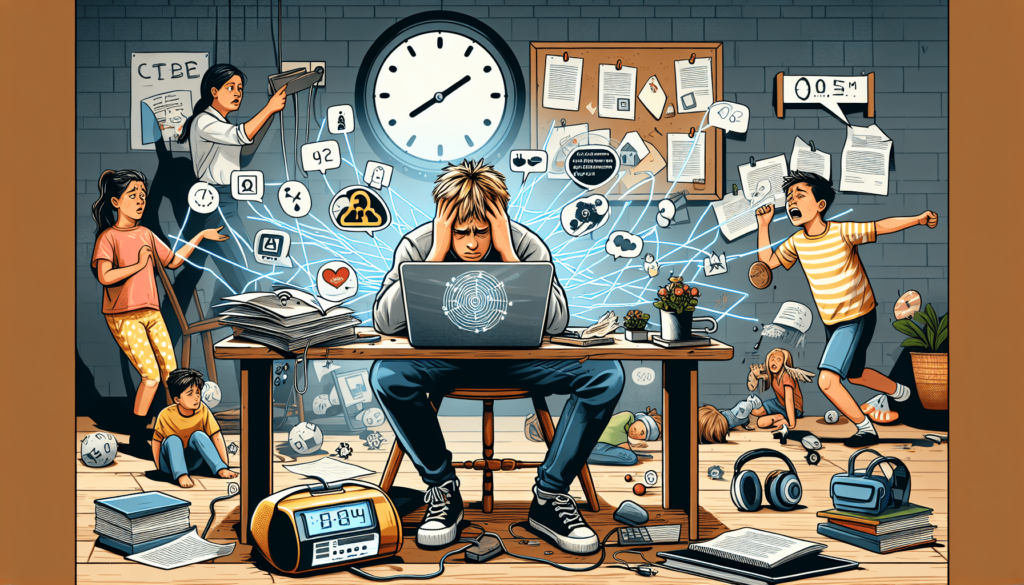Are you struggling with the challenges of remote education? It’s no secret that the sudden transition from traditional classrooms to virtual learning has posed numerous hurdles for students around the world. From the lack of face-to-face interaction to technical issues and distractions, adapting to this new form of education can be tough. But don’t worry, you’re not alone in this journey. In this article, we’ll explore some practical strategies and tips to help you overcome these challenges and make the most out of your remote learning experience. So grab your notebook and get ready to conquer the world of virtual education!
Create a Dedicated Study Space
When it comes to remote education, having a designated study space can make all the difference in your ability to focus and be productive. Choose a quiet and comfortable area in your home where you can concentrate without distractions. This could be a spare room, a corner of your bedroom, or even a quiet nook in the living room. Ensure that the space has proper lighting and ventilation to create an environment conducive to learning. A well-lit space will help prevent eye strain, and good ventilation will keep you feeling refreshed and alert. Finally, organize your study space with essential supplies such as pens, notebooks, textbooks, and any other materials you may need. Having everything you need within reach will save you time and minimize the chance of getting distracted.
Establish a Daily Routine
Creating a daily routine is crucial for remote education. Set specific study hours that work best for you and align with your personal preferences and energy levels. Whether you’re a morning person or a night owl, establishing a consistent schedule will help you stay on track and make the most of your study time. Remember to include regular breaks during your study sessions. Taking short breaks every hour or so allows your brain to recharge and helps maintain focus. Additionally, make sure to incorporate physical activity into your daily routine. Engaging in exercise not only promotes physical well-being but also boosts cognitive function, making you more alert and ready to learn. Lastly, maintaining a consistent sleep schedule is essential. Aim for seven to nine hours of quality sleep each night to ensure that you wake up refreshed and ready to take on the day.

Stay Organized and Manage Time Effectively
With the increased flexibility of remote education, it can be tempting to procrastinate or become overwhelmed with assignments and deadlines. To overcome these challenges, utilize tools that can help you stay organized and manage your time effectively. Consider using a planner or digital tools like a calendar or task management app to track your assignments, deadlines, and other important dates. Breaking down your tasks into manageable chunks can also help you stay motivated and prevent feelings of overwhelm. Prioritize your tasks based on their importance and urgency, and tackle them one at a time. By staying organized and managing your time effectively, you’ll be able to stay on top of your workload and reduce stress.
Minimize Distractions
One of the major challenges of remote education is dealing with distractions. It can be easy to get sidetracked by notifications on electronic devices or interruptions from family members or roommates. To minimize distractions, it is important to establish boundaries and create a conducive study environment. Turn off notifications on your electronic devices or, if possible, set aside a specific time for checking messages and social media. Communicate with your family members or roommates about your study schedule and ask for their support in minimizing interruptions during that time. If necessary, consider using noise-canceling headphones to block out any external noise and create a focused atmosphere.

Communicate with Teachers and Peers
Remote education may lack the face-to-face interaction of traditional classrooms, but that doesn’t mean you can’t actively engage with your teachers and peers. Actively participate in online discussions and forums, as these provide an opportunity to ask questions, share opinions, and learn from others. Don’t hesitate to ask for clarification or seek additional support when needed. Collaborating with classmates on group projects not only enhances your learning experience but also gives you the chance to build connections and share ideas. Effective communication with teachers and peers is key to overcoming the challenges of remote education and ensuring a successful learning experience.
Utilize Available Resources
Remote education provides access to a wealth of resources that can enhance your learning experience. Take advantage of online libraries and databases to access a wide range of academic materials, including books, scholarly articles, and research papers. If you’re struggling with a particular subject or concept, consider seeking virtual tutoring or academic support services. Many educational institutions offer online tutoring sessions or have resources available to help students succeed. Additionally, explore educational websites and apps that provide interactive content and supplementary learning materials. These resources can supplement your coursework and provide additional opportunities for learning and growth.
Manage Online Learning Platforms
Remote education often involves the use of online learning platforms. Familiarizing yourself with the features and navigation of these platforms is essential for a smooth learning experience. Take the time to explore the platform and understand how to access your courses, submit assignments, and interact with classmates and instructors. Practice good digital citizenship and online etiquette by following any guidelines or rules provided by your educational institution. Be respectful in your online interactions and avoid engaging in any behavior that may compromise your learning environment. If you encounter any technical difficulties, don’t hesitate to reach out to technical support for assistance. They are there to help you navigate any issues and ensure a seamless learning experience.
Practice Self-Care
Amidst the challenges of remote education, it is important not to neglect your well-being. Taking regular breaks to relax and rejuvenate is essential for maintaining focus and reducing burnout. Step away from your study space and engage in activities that bring you joy and relaxation. Whether it’s going for a walk, practicing a hobby, or simply taking a few minutes to enjoy a cup of tea, prioritize self-care as part of your daily routine. Engaging in physical exercise and maintaining a healthy diet also play a vital role in your overall well-being. Exercise not only boosts your mood but also enhances cognitive function, allowing you to perform better academically. Likewise, a nutritious diet fuels your body and mind, supporting optimal learning and focus. Finally, consider practicing mindfulness or meditation to reduce stress and promote mental clarity. These simple practices can have a profound impact on your well-being and ability to navigate the challenges of remote education.
Seek Support and Stay Connected
While remote education may feel isolating at times, remember that support is available to you. Reach out to your teachers, counselors, or mentors for guidance and support. They can provide valuable insights, answer questions, and offer encouragement when you need it most. Additionally, consider joining online study groups or virtual clubs related to your area of study or personal interests. These communities provide opportunities for social interaction and can help combat feelings of isolation. Finally, stay connected with friends and family through virtual platforms. Schedule regular virtual hangouts or study sessions to maintain a sense of connection and support each other throughout your remote education journey.
Stay Motivated and Celebrate Achievements
Remote education can present its fair share of challenges, but staying motivated is key to your success. Set goals for yourself and break them down into manageable milestones. When you achieve these mini-goals, reward yourself to maintain motivation and a sense of accomplishment. Find inspiration from successful individuals or stories related to your field of study. Learning about the achievements of others can fuel your own motivation and remind you of the possibilities that lie ahead. Finally, take time to reflect on your progress and acknowledge your accomplishments. Recognizing how far you’ve come and celebrating your achievements, no matter how small, is essential for maintaining a positive mindset and a sense of fulfillment throughout your remote education journey.
By following these tips and strategies, you can overcome the challenges of remote education and set yourself up for success. Remember that remote education requires discipline, organization, and adaptability, but with the right mindset and resources, you can thrive in this learning environment. Stay focused, stay motivated, and embrace the opportunity to learn and grow in new and innovative ways.

